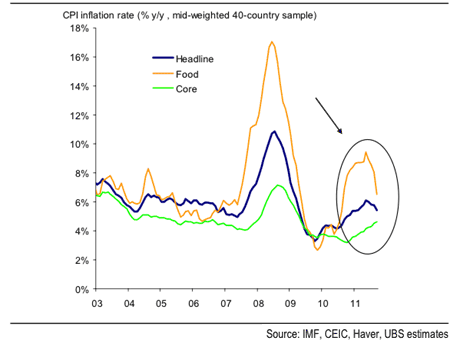
The scale of the European crisis is now too big to hide.
Greece is so dysfunctional that it’s struggling to accept its own bail-out. Italy is getting dragged into the mess faster than anyone had expected.
And yesterday, ratings agency Standard & Poor’s added to the chaos by accidentally downgrading France for two hours.
In the middle of this, it’s easy to lose sight of anything positive. Yet there is some good news.
One of the biggest threats for emerging markets earlier this year seems to be on the way out. And that suggests the outlook will be brighter within the year …
The threat from inflation
Go back a few months and the fears over emerging markets (EMs) were rather different to those facing EMs today. Investors were concerned that inflation was too high and would derail EM growth.
I was less concerned about this. The rise in inflation reflected two main things. The first was one-off shocks, such as the revolutions in North Africa and the Middle East, and a string of poor harvests, which drove up many commodity prices. EM policymakers couldn’t do anything about these, but the effects were always going to be temporary in any case.
The second issue was capacity pressures from within EM economies. In some ways this was encouraging, because it showed that demand was strong. However, central banks did need to tighten policy to stop their economies from overheating – and they were starting to do this.
Jump forward to today and what do we see? As the chart below from UBS shows, inflation is now very clearly rolling over, at least as far as food and the headline figures are concerned.
Core inflation (ie excluding food and energy) is still rising. But turning points in this tend to lag turning points in headline inflation, as lower commodity inflation feeds through the chain. I would be surprised if core inflation were still rising three months from now.
Indeed, in many key EMs, core inflation is already showing signs of levelling out – see the charts below from Capital Economics for China and India.
Investors are now fretting about growth
You’d think this would be seen as good news. But investors are largely ignoring it. Instead, when they’re not worrying about the eurozone, they’re worrying about growth.
And there are certainly plenty of signs that growth in most EMs is slowing. Car sales in India were down 24% year-on-year last month. Property transactions were down 25% month-on-month in China.
But given that EM central banks have been tightening monetary policy to deal with inflation and excess credit growth, it would be more surprising if growth wasn’t slowing. At times like this, it’s quite hard to understand exactly what investors want EMs to achieve.
India’s inflation is too high. That’s been caused by growth running too rapidly for the amount of spare capacity in the economy. So if you want to bring prices under control, you’re going to have to curb growth for a bit.
China has a property market that many people view as a bubble. Yet when the government takes steps to try to cool the sector down and stop things getting out of hand, the same investors are concerned about the impact this will have on growth.
These points of view are inconsistent and unhelpful. Ultimately, if EM governments are willing to act to slow their growth at this stage of the cycle, it’s healthier for their economies in the long run.
This is the normal cycle. Growth peaks amid rising inflation, slows as interest rates rise, and then can begin to pick up again as the central bank loosens policy.
The slowdown always exposes some problems. As I’ve written many times before, I would not be surprised if we begin to see some of the problems in China’s financial sector come to the fore in the near future.
But better that than storing them up. The West’s current woes reflect the fact that its central banks and governments believed the fairytale of the ‘great moderation’, and that there was no need to allow problems to be wrung out of the system on a regular basis.
Next year will be better for emerging markets
It is not going to be straightforward for EMs for the next few months. Growth is going to be slow everywhere, not just in their domestic economies. Europe is likely to return to recession. The US will probably avoid that, but growth will be unimpressive.
And the eurozone debt farce will rumble on. This will not be resolved quickly, because nobody is willing to accept reality.
But EM policymakers are likely to be able to declare inflation beaten for this cycle over the next three months or so. Most can then begin loosening policy. And as long as Europe avoids the very worst outcomes (a bad outcome is a foregone conclusion at this stage), EM growth is likely to pick up again within the year.
It’s been a tough five years for EMs. We’ve seen the global financial crisis and the eurozone crisis, both of which have encouraged investors to flee to safer assets. Yet over this period, the MSCI Asia ex-Japan is still handily ahead of the S&P 500 (see chart below).
EMs wobble more when inflation gets high and interest rates start to bite. And they certainly sell off harder during a panic. That’s what we’ve seen in 2011.
But the other side of this is that they perform much better when growth is strong and they’re likely to do better over the course of the economic cycle. So while the news is unlikely to get any cheerier in the next few months, it should be setting EM investors up for a much better 2012-2013.